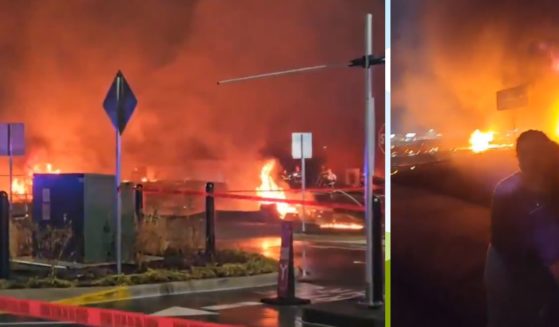
Biden Had Many Warnings That His Gaza Pier Was a Bad Idea
President Joe Biden ordered the construction of a temporary pier to deliver humanitarian aid to Gaza earlier this year even as some staffers for the U.S. Agency for International Development expressed concerns that the effort would be difficult to pull off and undercut the effort to persuade Israel to open “more efficient” land crossings to get food into the territory, according to a USAID inspector general report published Tuesday.
Biden announced plans to use the temporary pier in his State of the Union address in March to hasten the delivery of aid to the Palestinian territory besieged by war between Israel and Hamas.
But the $230 million military-run project known as the Joint Logistics Over-the-Shore system, or JLOTS, would only operate for about 20 days. Aid groups pulled out of the project by July, ending a mission plagued by repeated weather and security problems that limited how much food and other emergency supplies could get to starving Palestinians.
“Multiple USAID staff expressed concerns that the focus on using JLOTS would detract from the Agency’s advocacy for opening land crossings, which were seen as more efficient and proven methods of transporting aid into Gaza,” according to the inspector general report. “However, once the President issued the directive, the Agency’s focus was to use JLOTS as effectively as possible.”
At the time Biden announced plans for the floating pier, the United Nations was reporting virtually all of Gaza’s 2.3 million people were struggling to find food and more than a half-million were facing starvation.
The Biden administration set a goal of the U.S. sea route and pier providing food to feed 1.5 million of Gaza’s people for 90 days. It fell short, bringing in enough to feed about 450,000 people for a month before shutting down.
High waves and bad weather repeatedly damaged the pier, and the U.N. World Food Program ended cooperation with the project after an Israeli rescue operation used an area nearby to whisk away hostages, raising concerns about whether its workers would be seen as neutral and independent in the conflict.
The watchdog report alleged the United States had failed to honor commitments it had made with the World Food Program to get the U.N. agency to agree to take part in distributing supplies from the pier into Palestinian hands.
The U.S. agreed to conditions set by the WFP, including that the pier would be placed in north Gaza, where the need for aid was greatest, and that a U.N. member nation would provide security for the pier. That step was meant to safeguard WFP’s neutrality among Gaza’s warring parties, the watchdog report said.
Instead, however, the Pentagon placed the pier in central Gaza. WFP staffers told the USAID watchdog that it was their understanding the U.S. military chose that location because it allowed better security for the pier and the military itself.
Israel’s military ultimately provided the security after the U.S. military was unable to find a neutral country willing to do the job, the watchdog report said.
A U.S. official said the USAID staffer concerns about the project undercutting overall aid efforts were raised early in the process. USAID responded by adding enough staffing for the agency to address both the pier and the land routes simultaneously, said the official, who spoke on condition of anonymity because they were not authorized to publicly discuss the matter.
The Western Journal has reviewed this Associated Press story and may have altered it prior to publication to ensure that it meets our editorial standards.
Truth and Accuracy
We are committed to truth and accuracy in all of our journalism. Read our editorial standards.
Advertise with The Western Journal and reach millions of highly engaged readers, while supporting our work. Advertise Today.












